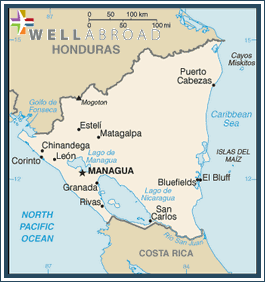|
MOST RECENT ALERTS
There's no recent alert.
|

|
|||||||||||||||
| COUNTRY OVERVIEW | ||||||||||||||||
|---|---|---|---|---|---|---|---|---|---|---|---|---|---|---|---|---|
|
| COUNTRY GENERAL INFORMATION | |||||||
|---|---|---|---|---|---|---|---|
| Language: |
Spanish 97.5% (official), Miskito 1.7%, other 0.8% (1995 census) |
||||||
| Currency: | gold cordoba (NIO) | ||||||
| Predominant Religions: |
Roman Catholic 72.9%, Evangelical 15.1%, Moravian 1.5%, Episcopal 0.1%, other 1.9%, none 8.5% |
||||||
| National Holidays: | Independence Day, 15 September (1821) | ||||||
| Economic Status: |
Nicaragua has widespread underemployment and the third lowest per capita income in the Western Hemisphere. Distribution of income is one of the most unequal on the globe. |
||||||
| Security: |
Army (includes Navy, Air Force) |
||||||
| US Presence: |
U.S. Embassy Managua
Kilometer 5.5 Carretera Sur Managua, Nicaragua Embassy Telephone: +(505) 2252-7100 |
||||||
| Document Requirements: |
A valid U.S. passport is required to enter Nicaragua. Although there is a bilateral agreement that waives the six-month validity passport requirement, U.S. citizens are urged to ensure before traveling that their passports are valid for the length of their projected stay in the country. U.S. citizens must have an onward or return ticket and evidence of sufficient funds to support themselves during their stay. A visa is not required for U.S. citizens; however, a tourist card must be purchased for $5 upon arrival. Tourist cards are typically issued for 30 to 90 days. A valid entry stamp is required to exit Nicaragua. Pay attention to the authorized stay that will be written into your entry stamp by the immigration inspector. Visitors remaining more than the authorized time must obtain an extension from Nicaraguan Immigration. Failure to do so will prevent departure until a fine is paid. The U.S. Department of State is unaware of any HIV/AIDS entry restrictions for visitors to or foreign residents of Nicaragua. Information about dual nationality or the prevention of international child abduction can be found on our website. For further information about customs regulations, please read our Customs Information page. |
||||||
| Major Airports: |
Airports: 176, Airports w/paved runways: 11 Managua – Augusto C Sandino International Airport (MGA/MNMG) |
||||||
| Servicing Airlines: |
|
||||||
| Risks and Precautions: |
US Dept. of State Travel Alert Issued 15 Nov 2008 Expires 12 Dec 2008
|
||||||
| Mortality Statistics: |
Infant MR total: 27.14 deaths/1,000 live births |
||||||
| Immunization Indicators: |
Required: None |
||||||
| Infectious Disease Concerns: |
Malaria risk area in Nicaragua: Risk in rural areas and in outskirts of Managua. Diarrhea in travelers is common and may be caused by bacteria, viruses, and parasites. Diarrhea caused by enterotoxigenic E. coli predominates, but other bacteria and protozoa (including Giardia, Cryptosporidia, and Entamoeba histolytica) can also cause diarrhea. Vaccination against Hepatitis A and Hepatitis B is strongly recommended. |
||||||
| Overall Quality of Medical Services: |
Medical care is limited, particularly outside Managua. Basic medical services are available in Managua and in many of the smaller towns and villages. However, treatment for many serious medical problems is either unavailable or available only in Managua. Certain types of medical equipment, medications and treatments are not available in Nicaragua. |
||||||
| Providers in Network: |
|
||||||
| Recent Medical Threats/ Concerns/Warnings: |
Dengue epidemics have affected most countries in Central America in the past 5 years. Filariasis, leishmaniasis, onchocerciasis (River blindness), and American trypanosomiasis (Chagas' disease) are diseases carried by insects that also occur in this region, mostly in rural areas. Risk to the usual traveler is low. Myiasis (botfly) is endemic in Central America. Protecting yourself against insect bites (see below) will help to prevent these diseases. |
||||||
| Communications Info: |
Country Code: +505 |
||||||






